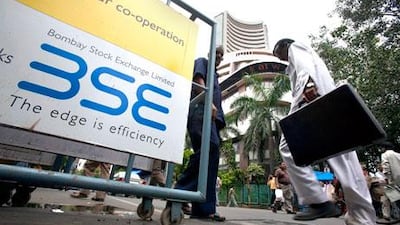MUMBAI // In an ambitious effort to ensure greater participation by Muslims in India's financial system, the Bombay Stock Exchange (BSE), the country's largest trading floor, yesterday launched a share index comprising stocks strictly compliant with Sharia law.
The Sharia 50 index comprises 50 of the largest stocks in the BSE 500 index that adhere to Sharia norms. The stocks will be screened by the Taqwaa Advisory and Sharia Investment Solutions (TASIS), an Indian Islamic finance company based in Mumbai.
"This is the first time a serious effort has been made to objectively track Sharia-compliant stocks in India," said Jamil Ahmed Shaikh, the director of finance at TASIS. "Lots of Muslims from around the world, especially the Middle East, want to invest in India's fast-growing market, but cannot decipher which businesses go against their religious principles. This index will meet that gap."
Mr Shaikh said the new equity index will be used to construct "socially responsible" investment products, including mutual funds and exchange traded funds.
India is home to the world's third-largest Muslim population, 175 million.
Despite strong demand among Muslims for investment products, India has so far offered limited opportunities for Sharia-compliant investing.
According to a 2006 report by a judicial committee appointed by Manmohan Singh, the prime minister, nearly 50 per cent of India's Muslim population remained excluded from the lucrative financial sector.
Another report by the Reserve Bank of India found that the credit-to-deposit ratio - the proportion of loan assets created against bank deposits - among Indian Muslims stood at 47 per cent compared with a national average of 74 per cent.
Experts say the new index will promote greater financial inclusion of India's Muslim population.
"This index will create increased awareness on financial investments [among Muslims]," said Madhu Kannan, the managing director and chief executive of the BSE. "It will give Islamic and other socially responsible investors another means to access the Indian market and will help attract pools of capital to India from the Gulf, Europe and South East Asia."
India has one of the largest number of Sharia-compliant stocks in the world. Last year, 132 such stocks were listed at the BSE and 337 at the National Stock Exchange, according to the consultancy KMPG.
Stocks for companies dealing in infrastructure, capital goods, information technology, telecommunications and pharmaceutical products form a major part of the BSE TASIS Sharia 50.
TASIS says it employs a tough proprietary screening process to exclude companies that deal in alcohol, conventional financial services such as banking and insurance, entertainment, tobacco, pork and conventional arms - all commercial activities that are not permissible under Islamic law.
Dr Shariq Nisar, the director for research at TASIS, says it conducts a review of companies listed on the index every month, and those that are found to have "become less Sharia-compliant" are immediately excluded. Inclusion on the list involves a meticulous three-level screening process, he says. In the first, the BSE recommends a pool of companies that it believes are compliant. In the second, TASIS checks whether its business operations fall within Islamic statutes.
If cleared in these two rounds, the company undergoes a rigorous financial screening. The company must not be heavily indebted: its debt-to-asset value must not exceed 25 per cent. And at least 97 per cent of its revenues must be generated from non-interest-based income.
The number of BSE-listed companies that TASIS found to be Sharia-compliant fell from 312 in 2007 to 132 last year. Most of the companies dropped were found to be "borrowing more during the financial crisis".
Dr Nisar admits that these criteria for inclusion on the index are "more conservative" than other global Sharia benchmarks such as the Dow Jones Islamic Markets Index, launched in Bahrain in 1999.
"We can afford to be more conservative because India's economy is very vibrant and offers great investor returns," he said.

